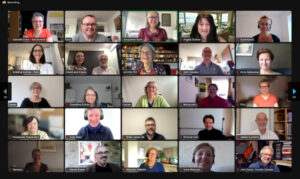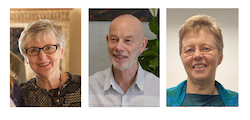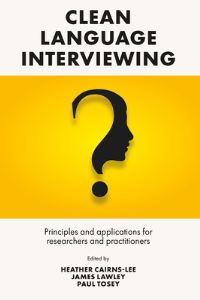The following transcript is of a demonstration on our fifth workshop with a group Ukrainian psychologists and psychotherapists who want to use Clean Language and Symbolic Modelling to support themselves and their clients. The aim of the session was simply to demonstrate Symbolic Modelling ‘live’.
Other transcripts from this series are available here.
The client’s responses and our questions were translated by Anna Stativka and Dr. Vladislav Matrenitsky.
This transcript is illustrative of a number of features:
The client presents with a potentially serious physical symptom and so before we start we clarify the scope of our agreement and our expertise.
Since the client does not know how to find the words she needs to help a mother tell her son his father has been killed in the war, we cannot develop her desired outcome directly. Instead we work adjacently [Link available shortly] – to maintain attention in the vicinity of the relevant experiences (see 7F to 15F and 39F) – until a resource metaphor emerges which will enable the client to support the family.
Key:
C = Client, F= Penny or James.
The format of the Clean Language questions is highlighted in bold to make it easier to see their structure.
Phase numbers refer to stages in the Symbolic Modelling Lite process.
When we capitalise the words, ‘Problem’, ‘Remedy’ or ‘Outcome’, we are using the definitions specified in the PRO model. When these words are not capitalised they are being used in a more everyday sense.
|
Row |
F/ C |
Transcript |
Annotation |
|
1 |
J |
And what would you like to have happen? | Starts Phase 2: Identify a desired Outcome |
|
2 |
C |
I would like the inflammation of my gums to stop. … [Before proceeding we clarify the scope of our agreement and expertise.] … This is not the first time when I have this inflammation when I’ve experienced some stress. So I consider this inflammation as a reaction of my body. It seems like on the surface I am calm. But I see it’s a reaction of my body that I am not managing the situation. And the day before yesterday in the family where I’m living at the moment, the young woman was notified that her husband had died in the war, in a battle, and that’s when I felt an activation of my symptoms of inflammation. And of course I’m trying to help support the family because I’m living with them. But probably I’m doing something wrong because of how my body is reacting to the situation. | According to the PRO model: – Wanting a Problem of “inflammation” to “stop” is defined as a Remedy. – “Trying to help support the family” is a desired Outcome. – “I’m doing something wrong” points to another Problem. |
|
3 |
J |
Okay, so it’s a reaction of your body that you’re not handling – you’re not managing the situation. And so what would you like to have happen when your body is reacting because you’re not managing the situation? | Continue with Phase 2 Requesting a desired outcome given the current problematic situation which is specified by using “when …”. |
|
4 |
C |
I would like to find another way of managing in this situation, and I’m grateful to my body that it has helped me. But I would like to find another way of managing this situation. | We regard this as a mixed Remedy-Outcome since it has the format of a desired Outcome but “another way” obliquely references the Problem. |
|
5 |
P |
And is there anything else about another way to manage this situation? | Start Phase 3: Develop the desired Outcome landscape |
|
6 |
C |
Probably I have to find some words, or other words. Because now together with this mother, with this woman, we have to tell the child that his father has died. And I don’t know how to find the words. | |
|
7 |
J |
So you have to find some words to help the mother tell this child. And where could words like that come from? | It seems incongruous to ask directly for words the client cannot find, instead we invite her to consider the source of those words. |
|
8 |
C |
I don’t know. [Pause] These words they exist somewhere in my mind but I cannot put them together. I’ve forgotten how to express myself. | When a client says “I don’t know”, we usually remain silent and wait, since, as in this case, it often means ‘I need a more time to find an answer’. |
|
9 |
P |
And the words exist in your mind but you cannot put them together. And when they exist in your mind, where in your mind do they exist? | |
|
10 |
C |
In my memory. | |
|
11 |
J |
In your memory. And whereabouts is your memory of those words? | |
|
12 |
C |
Probably somewhere in my brain. | |
|
13 |
P |
Somewhere in your brain. Whereabouts in your brain? | The primary function of the ‘Where?’ and ‘Whereabouts?’ questions is to keep the client attending to the vicinity of an experience (in this case the source of the words), and only secondarily about identifying a specific location. |
|
14 |
C |
I don’t know. [Pause] I have thought that probably what I want instead of words – I want to tear apart with my teeth all these abusers who who kill our people. This is probably what has created this feeling. And I don’t feel any hate or anger, just in a calm way to tear apart all of them. | |
|
15 |
J |
And to tear apart the abusers. And you need to find the words to tell the child that his father has died. And what kind of words are those words in your memory? | We acknowledge both the desire to “tear apart” and the immediate need to find the words to tell the child. Again, this question does not ask for the actual words (which may add to her “stress”), it asks “what kind of words” which gives the client the latitude to either answer with specific words or, more generally, with the nature of those words. Either way, attention stays in the same vicinity. |
|
16 |
C |
These words are about grief and about why his mother is crying. Because everybody loved him. | |
|
17 |
P |
Because everybody loved him. | Waiting to see whether “him” is the child or the father. |
|
18 |
C |
How everybody loves the child. | |
|
19 |
J |
Everybody loves the child. And this would support the family that you’re living with. | The client had said “I’m trying to help support the family” at line 2. |
|
20 |
C |
As much as it as possible. | |
|
21 |
J |
And so where does your want to support the family come from? | The client is beginning to consider the kind of words she needs to say, and more generally, she wants a “way of managing the situation” (4C). Given that the way people respond in stressful situations is state-dependent this question begins to attend to the kind of state the client will need to be in to support her to support the family. |
|
22 |
C |
From love. | A resource. |
|
23 |
P |
And from love. And what kind of love is a love that wants to support? | The next seven questions facilitate the client to develop the form and location of a metaphor for this resource (using a variation of the ‘From a feeling to a metaphor’ routine devised by David Grove [Link available soon]. |
|
24 |
C |
A kind of warmth here in the body. | |
|
25 |
P |
And a warmth in the body. And anything else about that warmth there, in the body? | |
|
26 |
C |
It’s kind of worrying and it’s a bit trembling here. | |
|
27 |
J |
Worrying and trembling. And so when there’s that warmth, the warmth of love in your body, and that trembling, where is that warmth and trembling? | |
|
28 |
C |
It looks like it’s in the solar plexus and a bit up, above. | |
|
29 |
P |
In the solar plexus and up. And does that warmth have a size or a shape when it’s in that solar plexus and up? | |
|
30 |
C |
It’s like two ovals, or spots – one bigger and another one less big. | |
|
31 |
J |
So there are two oval spots. Is there anything else about those two oval spots? | |
|
32 |
C |
They are connected with each other. | |
|
33 |
P |
And when they’re connected with each other, what kind of connected is that connected? | |
|
34 |
C |
It’s like an hourglass you know with glass parts and running sand [depicts shape with hands]. | |
|
35 |
P |
And when it’s like an hourglass, anything else about that hourglass that connects those two spots? | |
|
36 |
C |
Now I see it more like when we see the universe with galaxies which are connected to each other [depicts shape with hands]. | |
|
37 |
J |
Two galaxies connected. So when it’s like those two galaxies are connected there in your solar plexus, and that’s a warmth, and a trembling of a love that wants to support there, what happens to words in a memory? | Start Phase 4: Explore effects of desired Outcome landscape Now an embodied metaphor has emerged and developed a coherence over the last four answers, does it have an effect on the original desired outcome? … |
|
38 |
C |
I think they can be put together in a conversation. | … Yes, and this indicates something is changing for the client in real time. |
|
39 |
J |
They can be put together. And as those words are put together what kind of put together is that, of those words? | Start Phase 5: Mature changes Again, rather than going directly for the words, this question invites the client to attend to the process “put together” first mentioned at row 8C. |
|
40 |
C |
It looks like a spiral. | |
|
41 |
P |
What kind of spiral is that spiral? | |
|
42 |
C |
It’s like planets – like a galaxy where the planets – the words go one-by-one [gestures depict the metaphor]. | |
|
43 |
J |
So it’s like the planets in a galaxy, those words. And so when those words are put together like planets in a galaxy, then what happens? | |
|
44 |
C |
And then a kind of connection or link appears between the father who has died, and this boy. And the words they help the child to experience and realise this connection. | |
|
45 |
P |
And when words help a child to realise this connection with their father, then what happens? | |
|
46 |
C |
They have an opportunity to experience joy and happiness even though there is also grief. | |
|
47 |
P J |
And they get to experience joy and happiness, as well as grief. And as those words that are like planets in a galaxy that are connected and link that child with their father [pause]. And you would like to tear the abusers apart [pause]. And your support for the family comes from the love in your body that’s warm and trembling, what happens in your gums? | Given the client has had a range of experiences in the last 30 minutes, this invites her to consider what is now happening to her original presenting symptom. |
|
48 |
C |
First of all I’m starting to breathe. [pause] And my gums hold my teeth tightly. [pause] And right now I don’t feel any negative feelings or sensations. | Quite a shift! |
|
49 |
J |
And so is there anything else you need right now? | Start Phase 6: Set down Bringing the session to a close. With more time we would have continued maturing the changes (Phase 5). |
|
50 |
C |
I want to sit in a different way and feel my muscles [adjusts posture]. | |
|
51 |
P J |
So take all the time you need to sit in that way and feel your muscles, and begin to wonder what you would like to have happen next, now that you know you will find the words [pause]. And is it okay if we just leave this there? | |
|
52 |
C |
Yes, thank you |
Updated 3 December 2022








